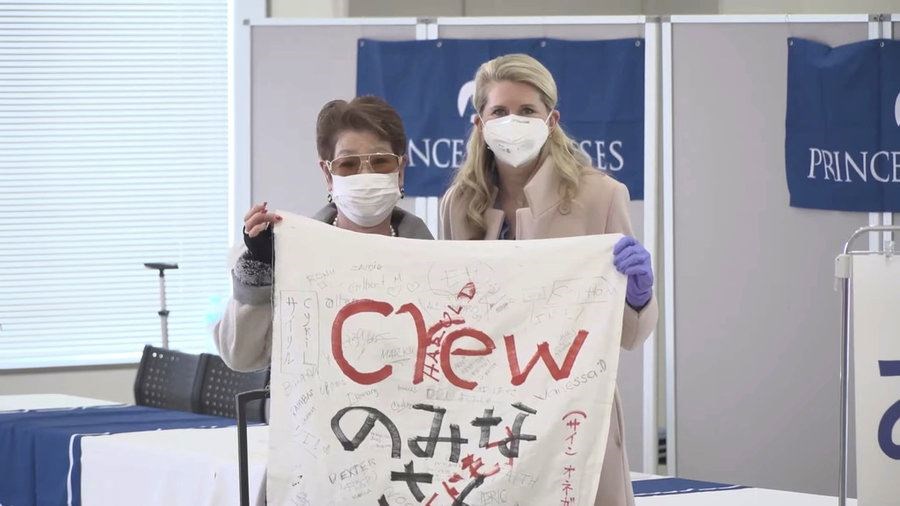REPRINTED WITH PERMISSION FROM THE CHRISTIAN SCIENCE MONITOR
Officials from Beijing to Washington are thanking those battling the coronavirus. The appreciation helps allay fear and form bonds across borders.
At the opening of his speech for International Women’s Day, Italian President Sergio Mattarella made a point of expressing gratitude to the women fighting the coronavirus in hospitals, laboratories, and quarantine areas. “They work in difficult conditions, with skill and a spirit of sacrifice, with dedication,” he said.
 Jan Swartz (right), president of Princess Curises, holds up a sheet with another woman thanking the cruise ship crew following a quarantine. Passengers disembarked Feb. 20 in Yokohama, Japan.Reuters
Jan Swartz (right), president of Princess Curises, holds up a sheet with another woman thanking the cruise ship crew following a quarantine. Passengers disembarked Feb. 20 in Yokohama, Japan.Reuters
In his press briefings, Vice President Mike Pence, as the White House point person on the virus outbreak, often peppers his comments with “profound gratitude” – to state leaders, the airline industry, and others – who are helping the federal government’s response. Meanwhile, Secretary of State Mike Pompeo has thanked Italy and South Korea, two countries with major outbreaks, “for their transparency and tireless work to administer care to those affected.”
China has thanked Japan for medical supplies and Bill Gates and his wife, Melinda Gates, for a $100 million pledge to help fight the outbreak. Iran appreciates Kuwait’s offers of help to deal with its crisis. Sri Lanka has thanked India for flying back some of its citizens from China.
At least one newspaper, The Straits Times of Singapore, has opened a webpage for people to pay tribute to front-line virus fighters. More than 1,000 people have penned a note. “I am never scared of the virus because of your efforts. Thank you,” wrote foreign worker Shanmugam Ganesan.
As all this public appreciation reveals, gratitude has become an essential tool during the global health crisis. And for many reasons. Gratitude helps put a focus on the good in a situation, dampening fear. It helps people form stronger bonds across borders and differences. It encourages generosity.
Yet to work as a supportive trait during a crisis, gratitude must be from the heart, not demanded. In China last week, Wang Zhonglin, Communist Party secretary of Wuhan, made the mistake of saying it was “necessary to carry out gratitude education among the people of the whole city” in order for them to express thanks to Xi Jinping and the ruling Communist Party for the way they are handling the crisis. In the face of a public uproar, his comments were taken down from official sites.
To correct the mistake, Ying Yong, party chief of Hubei province, said the people who have been under a strict quarantine were the real heroes. “I hereby express my sincere gratitude to the people of Wuhan and Hubei,” he said. And indeed, the World Health Organization has said the world is “in debt” to the 55 million people of Hubei for their sacrifice in trying to contain the virus.
At times of panic, expressing appreciation can serve as a reset. It allows calm and reflective thinking, just what is needed to bring a healing perspective during an epidemic.
Page created on 3/13/2020 3:21:22 AM
Last edited 3/13/2020 3:36:02 AM
